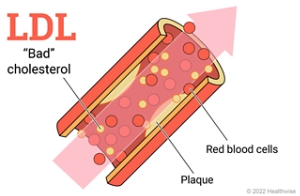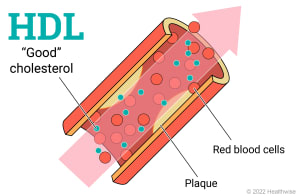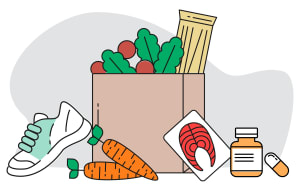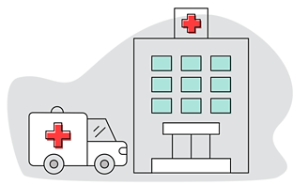Learning About High Cholesterol
What is high cholesterol?
High cholesterol means that you have too much cholesterol in your blood. Cholesterol is a type of fat. It's needed for many body functions, such as making new cells. It's made by your body. It also comes from food you eat (meat and dairy products).
Having high cholesterol can lead to the buildup of fatty deposits called plaque (say "plak") in artery walls. This can increase your risk of heart attack and stroke.

When doctors talk about high cholesterol, they are talking about your total cholesterol and LDL cholesterol levels. LDL is sometimes called the "bad" cholesterol.

Your doctor may also speak about HDL levels. HDL is sometimes called the "good" cholesterol. High HDL is linked with a lower risk for heart attack and stroke.
How can you help prevent high cholesterol?

Eat high-fibre foods, such as fruits, vegetables, and whole grains.

Eat lean proteins, such as seafood, lean meats, and beans.

Eat healthy fats, such as canola and olive oil.

Choose foods that are low in saturated fat, such as avocados, nuts, and low-fat milk or yogurt.

Limit sodium and alcohol.

Limit drinks and foods with added sugar.

Try to be active at least 2½ hours a week.

Get to and stay at a healthy weight.

Don't use tobacco or nicotine, and talk to your doctor if you need help quitting. Visit www.albertaquits.ca for more information.
How is high cholesterol treated?

Treatment focuses on heart-healthy lifestyle changes. It may also include medicines.

Treatment reduces your risk for a heart attack or stroke. The goal of treatment is to lower your LDL cholesterol levels.
Where can you learn more?
Go to https://www.healthwise.net/patientEd
Enter Q621 in the search box to learn more about "Learning About High Cholesterol".
Adaptation Date: 07/17/2023
Adapted By: Alberta Health Services
Adaptation Reviewed By: Alberta Health Services
